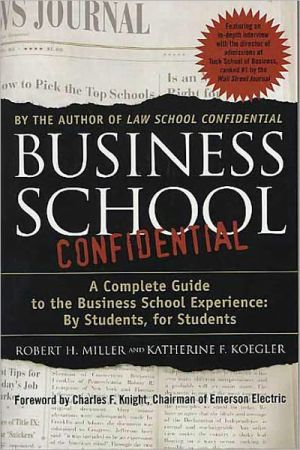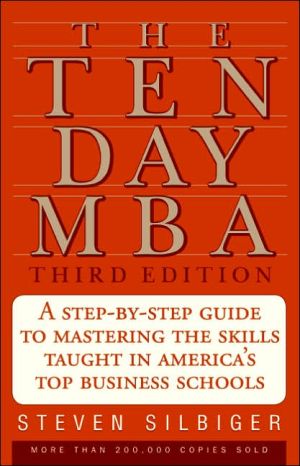Business School Confidential: A Complete Guide to the Business School Experience: By Students, for Students
Featuring an in-depth interview with the Director of Admissions at Tuck School of Business, ranked #1 by the Wall Street Journal.\ Written for students about to embark on this two-year odyssey, by students who have successfully survived business school, Business School Confidential provides a comprehensive, blow-by-blow chronological account of the complete MBA experience. Miller and Loucks have assembled a panel of recent MBA graduates from across the country, all of whom are in a prime...
Search in google:
Featuring an in-depth interview with the Director of Admissions at Tuck School of Business, ranked #1 by the Wall Street Journal. Publishers Weekly For college students thinking about applying to business school or for those in the workforce considering an additional degree, the authors give the lowdown on taking the GMAT, choosing a school, funding your education, selecting a major, preparing for exams and seeking full-time employment upon graduation. Miller (Law School Confidential) and Loucks, a recent graduate of Northwestern University's Kellogg Graduate School of Management, interviewed current MBA students to get the skinny on the "business school experience." They include handy tips for admissions interviews, getting a federal loan to pay for school, determining an appropriate workload and obtaining that coveted summer internship. Although the advice on "business school etiquette" is somewhat unnecessary ("do not speak out of turn"), for the most part, this is a valuable tool for those ready to throw themselves into b-school. (Aug. 20) Copyright 2003 Reed Business Information.
Business School Confidential\ 1So You Wanna Get an M.B.A."Know the right moment."—THE SEVEN SAGES \ \ \ IT PROBABLY COMES as no surprise to you that pursuing a master's degree is an expensive and time-consuming proposition. Leaving a solid, well-paying job to pursue an M.B.A. should be a carefully considered and calculated decision. Before committing two years of your life; at least $60,000 in tuition, fees, and housing; and the "opportunity cost" of the experience—ask yourself the following questions and force yourself to really think through your honest responses to them. It may help to actually write your answers down. Taking the time to do this will make it easier to carefully and properly evaluate business school as a next step in your career. \ \ \ Why do I really want to go to business school? \ There are many possible responses to this question, and most business school applicants actually have more than one. Many of these reasons are well thought-out and will empower your experience. Others, however, should not be the premise upon which you decide to apply."I think deciding whether or not to go to business school is amatter of figuring out where your interests lie," Dave notes. "If you are happy working in the accounting sector or the marketing sector and have no desire to cross over into other areas in the future, then you may not need to go to business school. If you want to explore new areas of business, grow your understanding of how business works, and give yourself the option of moving around in the future, then you should give serious thought to business school."Andy agrees. "I would encourage anyone thinking about applying to business school to carefully evaluate their career objectives. The fact of the matter is that too many people have a great deal of uncertainty about that. The most important step is to figure out what it is that you really want to do, and to do that before you apply." "When I first applied to Wharton in 1996, I had no idea what I was looking to get out of my business school education. I could not articulate the value that an M.B.A. would have for me. It was only the second time around, after a great deal of independent research and countless conversations with other business school graduates that I appreciated why it was that I wanted to go to business school," Brett admits. "You want to be able to look at your career to date, and specify exactly how getting an M.B.A. will help you grow, both professionally and personally."Okay. So this is the time of reckoning. Check to see if one or more of your reasons for applying to business school appears on this list:• I kicked ass on the GMAT—I can't ignore that, can I?• I hate my job, so this will be my "way out."• The economy stinks, and I just got laid off, so why not go back to school?• This is what all my friends are doing—they can't all be wrong ...• Everyone else in my firm has an M.B.A.• I don't understand science, so med school is out, and law school requires too much reading. What else is there? If your primary reason for applying to business school is represented by one or any combination of the responses from the list above—slam on the brakes! It's time to spend some more time considering your motivations. Follow along, and you'll see why. \ \ \ I kicked ass on the GMAT—I can't ignore that, can I? \ Uh ... yeah. You can ... and if crushing the GMAT is your best reason for applying to business school, you probably should!While you are to be congratulated for acing this important test, the only thing the GMAT measures with certainty is how well you did on a certain set of computerized questions on one given day.That's it.The Educational Testing Service (ETS) would have you believe that there is a strong correlation between an individual's performance on the GMAT and his success in business school and in business in general, but this claim is certainly not without controversy. Doing well on the GMAT is not a guarantee that you will do well in business school and, more importantly, it says nothing about whether you are well suited for business school, will enjoy business school, or actually need the degree. There are many successful CEOs, financiers, and entrepreneurs who never set foot in a business school classroom. You need a better reason than a good score on a standardized exam to make this level of commitment. View a good GMAT score simply as an element of your application—not as the justification for it.A good GMAT score may get you into the dance, but it's no guarantee you'll be happy to be there. Force yourself to look deeper for a better motivation. \ \ \ I hate my job, so this will be my "way out." \ Okay ... so you'd be willing to pay a headhunter $80,000 and give him two years of your life in exchange for a new job, right? No?Then why would you pay the lofty price of attending business school just to get out of your present employment situation? This is pure laziness. If you hate your job, contact a headhunter, search the classifieds, or hop on the Internet and cruise the myriad employment sites offered there for free. Applying to business school—or any graduate program, for that matter—because you hate your current job and have no idea what you really want to do with your life, is a recipe for disappointment.Why? Because with no idea why you want to go to business school, you'll have a difficult time making a convincing case for yourself in your admissions essays and interviews, which may lead to rejection after rejection, and a waste of the time and money associated with applying. If do you happen to fool somebody into offering you admission, however, when you get to business school, you'll still have no idea why you are there—no particular focus, no direction, and no passion fueling your study. Sure, you might find your passion while you are there, but you are just as likely not to. Know where you'll be then? Right back where you started. Frustrated, without direction, resentful of your employment situation ... $80,000 in debt, and two years older.Read on. \ \ \ The economy stinks, and I just got laid off, so why not go back to school? \ So you got laid off and the economy is in recession. In the year 2001, a record number of people applied to business school as a result of layoffs and the downturn in the economy. A popular rumor that year had it that one out of every five pieces of mail coming out of Silicon Valley post offices was a business school application.If your employment status and the economy are your primary motivations for applying to business school, you are not alone. Recognize, however, that these are not the kinds of motivations likely to impress admissions committees inundated with applications from thousands of candidates in the same position. Not to mention the fact that your chances of admission are significantly decreased due to the increased number of applications!Finally, you should also be aware that simply having an M.B.A. is not a guaranteed ticket to a well-paying job after graduation. If the economy hasn't improved by the time you graduate, you could still be without a job—with the additional burden of your student loans. Many members of the business school classes of 2001 had their employment offers rescinded because of economic factors, and countless others had their start dates pushed back by many months.Don't use business school as a backup plan. \ \ \ This is what all my friends are doing—they can't all be wrong ... \ Known to past generations as the Brooklyn Bridge theorem. You know, the one your mother always used to rebut this reasoning. "If all of your friends were going to jump off the Brooklyn Bridge ..."Forget what all your friends are doing. Your friends may have very good reasons for applying to business school, or may have absolutely no clue why they are doing so. Either way, unless their reasons apply directly to you—what your friends are doing should have no impact on your decision. Don't be a lemming. Your friends won't be ponying up the monthly debt service payments on your student loans for the next ten years, so don't let them decide whether you should go to business school. \ \ \ Everyone else in my firm has an M.B.A. \ This might be a good reason to go to business school—if you have long-term intentions to stay at your current place of employment, and if your superiors have indicated to you that an M.B.A. would help you advance. Some companies do impose a sort of "glass ceiling" which, at some point, can stop people without M.B.A.s from further ascension through the ranks. But before you start completing those applications, sit back and ask yourself the hard questions. What do you hope to get out of business school, and what will be the "opportunity cost" of two years away from the working world? Finally, before you leave the working world for business school with only a year or two of real-world experience, consider the fact that when you graduate, prospective employers, including the company you left, may look at you as an inexperienced, overeducated prospective employee with a high price tag.Not necessarily a recipe for success.If you leave your company to go to business school for the aforementioned reason, be relatively certain that you'd like to work there long-term, and get some assurances that the company actually wants you to work there long-term. And finally, be aware that in the two years you are away, economic factors can change that could wholly change these circumstances.The bottom line is, it is generally best not to go to business school unless it is actually something you want to do for yourself. \ \ \ I don't understand science, so med school is out, and law school requires too much reading. What else is there? \ And the only other option in the world is to apply to business school? Come on, think a little harder.The world is full of interesting opportunities. Don't default into applying to business school just because you feel you need a graduate degree, don't want to do medical school or law school, and can't come up with another alternative. The decision to go to business school should not be based solely on the things you know you don't want to do. Even if you managed to get admitted with this flimsy rationale, passion won't be driving your experience, and as a result, the experience won't be nearly as enjoyable or fulfilling. Make the decision to pursue an M.B.A. based on your long-term goals, and the specific skills and knowledge you want to gain that will help you reach those goals."Some people have told me that they pursued their M.B.A.s for personal reasons, to help them better understand the stock market and how to manage their own investments. Can you believe that? Business school is too time-consuming and too expensive to undertake for something you could get with a subscription to the Wall Street Journal and a library card!" Dave warns.Even if you have figured out that you are interested in business, it does not necessarily mean that going to business school is the right choice. "Business school is definitely not for everyone," David cautions. "The two most successful young entrepreneurs I know wouldn't do well in an M.B.A. program. Given their natural business sense and insane productivity, they probably would have problems with the pace and find it to be a waste of time." \ \ "All right, all right," you're saying. "Enough gloom and doom, and enough lecturing about why I shouldn't go to business school." Assuming you have navigated the above rationale no-nos and know that none of those reasons is your impetus for going to business school—how do you actually figure out whether business school is right for you? Ah ... Read on.A REALISTIC EVALUATION OF YOUR READINESS FOR BUSINESS SCHOOLGo somewhere where you can be undisturbed for the next thirty minutes or so and force yourself to answer this next set of questions honestly. Turn off the TV, turn off your cell phone, and concentrate—because in the next couple of pages, we're going to figure out whether you should apply to business school or not. "You need to decide what it is you want to do, what skills you'll need to get there, what skills you'll need to be effective once you do get there, and then determine whether the skills you need are skills best gained in the business school arena," Alden explains."And you need to do that before you apply," Andy insists.So don't just passively read these questions and plow forward. Force yourself to engage them, and reflect on the real answers that come from your heart and your gut. You paid good money for this book. Use it! This might be the most valuable exercise you undertake during this entire process.• What exactly do you want to do with your M.B.A. once you have it?• Can you accomplish those career goals without an M.B.A. or is the degree viewed as a rite of passage that will accelerate your promotion track and help you penetrate upper management?• Will an M.B.A. increase your perceived value by employers? How have you determined this?• Will an M.B.A. enable you to earn a higher salary in your field of interest? How have you determined this?• Have you asked anyone in your primary field of interest these questions? Did their answers definitively support your going to business school?• What do you hope to get out of your time in business school?• What disciplines do you want to focus on? Finance? Marketing? Nonprofit management? Entrepreneurship? Negotiation? Why? How will these skills help advance your career goals? Don't know the answers to one or more of these questions? That's okay—a lot of us didn't ... but this is one of the lessons we learned: Do your homework up front so you know exactly why you are applying to business school and what you want to get out of it. The ability to really hone in and focus on your career goals during business school will give you real power. Before you apply to business school, research the answers to these questions, and have a clear answer for each one. You'll be glad you did.Now ask yourself this second set of questions, which has more to do with the everyday experience of business school:• Are you self-reliant, or do you depend on others for constant encouragement, evaluation, and/or affirmation?• Are you comfortable with, and do you enjoy working with, people of varied backgrounds and skill sets?• Can you seize the main points of an assignment and move on, or do you typically get bogged down in minute details?• Are you comfortable speaking out in front of a group and arguing your positions in front of others?• Do you like to think creatively?• Are you disciplined enough to get up and attend classes on a daily basis?• Are you prepared to sacrifice most weekday evenings to assignments, and many weekends to group meetings, projects, and other school-related activities?• Are you adept at, and do you enjoy, managing several tasks simultaneously?• Are you a go-getter? Is your personality more proactive than reactive?• Are you 100 percent committed to business school, or do you have several other hobbies and interests competing for your time?Time CommitmentBusiness school is extraordinarily time-consuming. Between classes, reading assignments, case preparation, groupwork, extracurricular activities and events, exam preparation, and job hunting, very little of your time during at least the first year and a half will be your own. The typical business school day begins at eight or nine in the morning and frequently ends with a group project or class preparation that will take you well into the evening hours. Don't expect business school to be a "nine-to-five" kind of experience, and don't plan to see a lot of your spouse or children during the experience. Business school is a full-time commitment. Thinking you can make it otherwise is a fool's folly. Forewarned is forearmed.TeamworkBusiness school is a graduate preparatory program for future business managers. As such, business school involves a lot of group work to train students for their future roles dealing with project team members, superiors, and subordinates.Often, especially in the first term, group members will be assigned, rather than selected. Nonvoluntary group assignment is an effort to get students of different vocational, cultural, and ethnic backgrounds to learn to work with each other. It is not always easy, but working through such vocational, cultural, and ethnic differences and biases can be eye-opening and immensely rewarding, and provides excellent training and preparation for a business career.Group work requires students to divide labor, assign responsibilities, and depend on each other. It also helps students learn, sometimes the hard way, the importance of supporting and strengthening the weakest link in order to allow the group to prosper as a whole. You must be willing to both lead and follow, talk and listen, carry out your own responsibilities and teach others. At some point, everyone is the weakest link on a project. The group experience—both giving and receiving—can teach you a lot.The Necessity of MultitaskingIn addition to teaching students to become better managers of people, business school trains students to be able to manage several different tasks at once. Most business school students take at least four classes each term, are involved in several nonacademic groups, clubs, or other extracurricular activities, and are constantly networking, job hunting, or going on interviews and callbacks. Among all of these commitments, you will frequentlyfind yourself with a dozen or more projects, responsibilities, and deadlines to manage at the same time. And you don't have a personal assistant to help keep it all straight! If being organized (or at least learning to be organized) and managing several areas—including your academic life, your prospective future in the working world, and your commitment to others—at the same time does not sound like your bag, you might want to reconsider a career in business.CompetitionHowever subtle it may be, in business school, nearly everyone is looking out for Number One. It may sound harsh and even like a contradiction, given all the groupwork and encouragement to collaborate with your classmates, but at the end of the day, business school is, after all, professional school—and everyone has her own agenda to further.Competition at most business schools is keen both inside and outside the classroom. Most schools operate on a strict grading curve, mandating that a certain percent of As, Bs, Cs, and Fs be distributed in each class. The lowest grades (that's an F to you and me, folks) are routinely given, and some schools even mandate that the lowest 10 percent of each course be failed to "separate the wheat from the chaff." This does make grades a zero-sum game in business school—and, as you might expect, that can foster serious competition between students.While competition in the classroom is tough, the more overt battles are waged during recruiting season. During recruiting season, there are appearances at company recruiting events, networking opportunities with alumni, and round after round of competitive interviewing. Students vie with each other to attend the most recruiting events (some of which are by invitation only), to meet the largest number of potential employers, and to beinvited to the largest number of "closed" interviews (granted by invitation only and discussed at length in later chapters).Recruiting season is dealt with twice in this book—for first-year students, and again for second-year students—and those chapters treat extensively with how to navigate the unpleasantness that often arises out of this season of open competition among friends and classmates. Suffice it to say, for now, that if you can't stomach overt competition for grades and jobs, you may want to reconsider your consideration of business school, and a career in business in general.ConclusionFigured it out yet? Hopefully, this chapter has forced you into some serious introspection, and with any luck, that process has either convinced you that you are not ready to go to business school, or has helped to crystallize the reasons why business school is the right move for you at this point in your life.But what if, after all of that, you're still not sure? Read on. We think the next chapter will help a lot. Once you've finished reading it, come back and reread this chapter again.BUSINESS SCHOOL CONFIDENTIAL. Copyright © 2003 by Robert H. Miller and Katherine F. Koegler. Foreword copyright © 2003 by Charles F. Knight. All rights reserved. . No part of this book may be used or reproduced in any manner whatsoever without written permission except in the case of brief quotations embodied in critical articles or reviews. For information, address St. Martin's Press, 175 Fifth Avenue, New York, N. Y. 10010.
AcknowledgmentsixForewordxiIntroduction: How to Use This BookxiiiThe Business School Confidential Mentorsxxi1.So You Wanna Get an M.B.A.12.Taking It to the Top: Advice from Five Top CEOs About How to Determine When, and If, Business School Is Right for You153.Beating the GMAT234.Applying to Business School335.On What Really Matters in the Business School Application: A Candid Look at the Application Process with Kristine Laca, Director of Admissions of the Tuck School of Business at Dartmouth516.On Choosing a School697.An Investment in Your Future838.The Things to Do Before Classes Begin979.An Overview of the Typical First-Year Curriculum11710.Getting Out of the Gate12711.The Unspoken Code of Business School Etiquette14112.How to Succeed in the First-Year Summer Recruiting Process15713.Taking Stock of Your Progress: Exams, Projects, and Papers18114.Charting Your Course in Business School18915.The Keys to Ascension: The Summer Internship Survival Guide19716.Making the Turn: What Makes This Year Different from the Last?21117.Recruiting in the Second Year: The Quest for Permanent Employment21518.Parting Thoughts235About the Authors237
\ From the Publisher"Wondering what it takes to get into business school? Trying to determine whether an M.B.A. will advance your career? Uncertain about what business school is really all about, and what it will take to succeed when you get there? If you are considering business school, currently applying to business school, or presently in business school, Business School Confidential is a book you should not be without"- Princeton Review\ "Thorough... its thoughtful insights will stick with b-school candidates long afterwards." - BizEd Magazine\ \ \ \ \ \ Publishers WeeklyFor college students thinking about applying to business school or for those in the workforce considering an additional degree, the authors give the lowdown on taking the GMAT, choosing a school, funding your education, selecting a major, preparing for exams and seeking full-time employment upon graduation. Miller (Law School Confidential) and Loucks, a recent graduate of Northwestern University's Kellogg Graduate School of Management, interviewed current MBA students to get the skinny on the "business school experience." They include handy tips for admissions interviews, getting a federal loan to pay for school, determining an appropriate workload and obtaining that coveted summer internship. Although the advice on "business school etiquette" is somewhat unnecessary ("do not speak out of turn"), for the most part, this is a valuable tool for those ready to throw themselves into b-school. (Aug. 20) Copyright 2003 Reed Business Information.\ \








